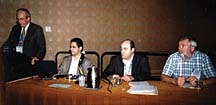Some answers were provided at the most recent International Institute of Ammonia Refrigeration (IIAR) Conference and Trade Show here. A panel session of presenting end users drew a roomful of contractors for a discussion titled "End Users' Perspectives on Evaluating Contractors."
Mike Lynch of U.S. Cold Storage talked about the screening that takes place before the bidding process begins. He said his company looks at the contractor's safety records, injury and illness logs, and reports from the Occupational Safety and Health Administration (OSHA).
Wendell Marshall of Versacold Cold Storage said contractor evaluations "are not six-month programs of dart games." He also noted that his company does not centralize the operations of its 24 warehouses. "We depend on the on-site people to run our warehouses as independent businesses." That means a lot of contractor-selection decisions rest with local managers.
The selection process, he said, looks at experiences with sites similar to the planned facility, the size of the contractor (smaller is not necessarily better), company history, then price. He noted that one reason for this local control is that much of the site monitoring and inspection are handled by local government agencies in Canada. As more national regulations develop, Marshall predicted changes in his company's approach.

Prequalification
Chad Merchant of Tyson Foods spoke on prequalification, including the requirement that contractors fill out a questionnaire. He also looks at worker compensation claims and safety issues.He ticked off the types of questions his company asks:
Said Merchant, "The purpose is to come up with an informed decision, even though it can never really be black or white. The process provides guidance."
Harold Vastag, a retired IIAR member who spent a number of years overseeing food plants and warehouses, said he always expected contractors chosen to be those that had a good record of being on time.
He said he also liked to "build up a stable of reliable contractors" to draw on as projects developed. To Vastag, it was important that contractors be members of trade associations such as IIAR and the American Society of Heating, Refrigerating, and Air-Conditioning Engineers (ASHRAE). "That goes a long way to proving they are committed to the job."
During a question-and-answer session, end users said they wanted to be aware of the "dark side" of a contracting company. Those negatives could relate to a poor track record when it came to leaks in a weld, jobs that did not go well, and timelines that went awry.
One contractor complained about end users who may have a lot of elements in an evaluation, but then choose "the hot price that comes in 20 percent less. Then the end user forgets all the talk about mom and apple pie."
In response, end users in general maintained that their evaluation factors include price, but that price was only one element in their decision-making process.
One contractor bemoaned end users who buy products directly from manufacturers and then hire a contractor only for the installation. End users said that does happen, but it's part of an overall business decision.
Publication date: 06/07/2004


Report Abusive Comment